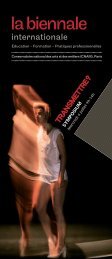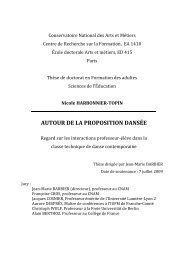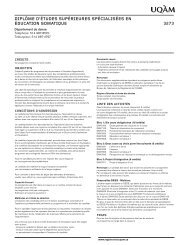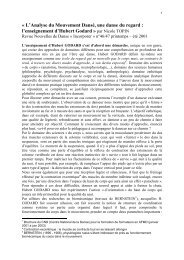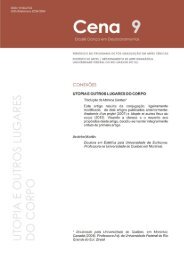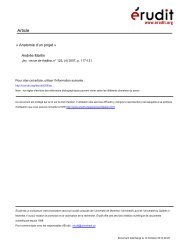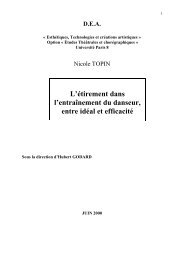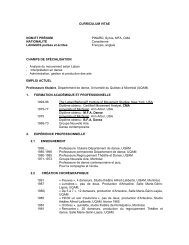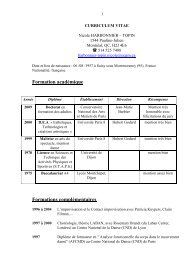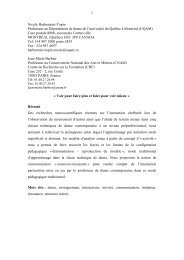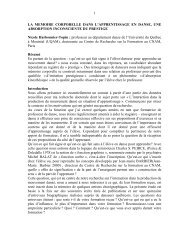Day 2 - Département de danse - UQAM
Day 2 - Département de danse - UQAM
Day 2 - Département de danse - UQAM
Create successful ePaper yourself
Turn your PDF publications into a flip-book with our unique Google optimized e-Paper software.
3:45pm — break<br />
4:00pm-5:30pm<br />
a) The Intersections of English and Theatre George<br />
Roundtable Organizers: Heidi Verwey (Thompson Rivers University). Participants: Robin Nichol<br />
(Thompson Rivers University), Ginny Ratsoy (Thompson Rivers University), Natalie Meisner (Mount<br />
Royal University), Robin C. Whittaker (St. Thomas University), Kathryn Prince (University of Ottawa),<br />
Lour<strong>de</strong>s Arciniega (University of Calgary)<br />
The relationship between English and Theatre has always been a symbiotic one, but there also seems to be the potential for<br />
each discipline to hin<strong>de</strong>r the other. In a Guardian article from 2008 entitled Is Three Years of Theatre School Still the Best Way<br />
to Become an Actor? Iain Reekie, Program Director of the Sidcup School states that “80% of the course is practice-based, and<br />
it always will be, whereas many universities are offering courses that are mainly aca<strong>de</strong>mic but have a practical element. I think<br />
what we’ve seen is a shift that now allows the aca<strong>de</strong>mic world to recognize that practice-based work is just as valuable. We<br />
see no reason why our <strong>de</strong>grees shouldn’t have the same kudos and respectability as a <strong>de</strong>gree in engineering.” But he goes<br />
onto say “those with good <strong>de</strong>grees often do better in the profession.” This might be because the aca<strong>de</strong>mic component has<br />
ma<strong>de</strong> them strategic thinkers, something he believes is crucial if “we are going to produce actors who don’t just service the<br />
industry like puppets, but also help to change it.”<br />
Is theory always essential to practice? How do we foster connections and build best practice relationships among<br />
professors working within these disciplines? While we invite papers on any aspect of the relationship between English and<br />
Theatre, we especially welcome those that directly address the conference theme of “@ the Edge” by examining how Theatre<br />
and English can engage with each other in non-traditional or innovative ways. Theoretical perspectives, case studies,<br />
narratives, and comparative work on contemporary theatrical and the Theory/Praxis relationship are among the anticipated<br />
approaches.<br />
b) Where is the Empathy in Acting and Actor Training? McIntyre<br />
Praxis Workshop Organizer: Clayton Jevne (Theatre Inconnu)<br />
This Workshop/Demonstration—through reference to research studies in behavioral sciences, published statements by<br />
leading theatre theorists, and vi<strong>de</strong>o footage of actors (stu<strong>de</strong>nts and professionals)—will follow a progression of logic<br />
supporting the argument that the current implied premise un<strong>de</strong>rlying actor training theory and practice (acting with scripted<br />
text) is flawed and compromises the establishment of a safe and respectful learning environment, while limiting the potential of<br />
the artform. I will explain how the conditions <strong>de</strong>emed necessary for optimal skill acquisition have been effectively eliminated<br />
from current actor-training practices, and how the elimination of these conditions has also un<strong>de</strong>rmined the conditions that<br />
encourage empathy between stu<strong>de</strong>nt and teacher, and subsequently between the character being portrayed and the<br />
audience. The evi<strong>de</strong>nce presented will show how the current implied premise assumes that the qualities characterizing the<br />
relationship between verbal and nonverbal expression displayed by the stu<strong>de</strong>nt actor while speaking scripted learned text, will<br />
be naturally and spontaneously influenced by the circumstances inherent in the text, just as these qualities would be<br />
influenced by circumstances inherent in comparable situations occurring in “real-life”; given that the stu<strong>de</strong>nt has sufficient<br />
intellectual un<strong>de</strong>rstanding of—and emotional affinity for—the text, and has experienced a training regimen purported to ren<strong>de</strong>r<br />
the stu<strong>de</strong>nt open to the spontaneous influence of the scripted circumstances. A new premise will be presented that:<br />
recognizes the irreconcilable difference between the influencing nature of scripted and real-life circumstances; accommodates<br />
the conditions necessary for effective skill <strong>de</strong>velopment; advances the growth of the artform by maximizing audience/character<br />
empathy; and promotes a safe learning environment by encouraging greater empathy between stu<strong>de</strong>nt and teacher. This<br />
<strong>de</strong>monstration/workshop will involve participation in introductory exercises specifically <strong>de</strong>signed to incorporate the conditions<br />
that skill <strong>de</strong>velopment research has <strong>de</strong>termined must be present for skill transference. These exercises represent the basis for<br />
an alternate empathic approach to actor training. This is a scientifically supported approach to actor training that is unique, and<br />
has grown out of twenty-five years of research study, observation, and practical application. This <strong>de</strong>monstration/workshop can<br />
accommodate any number of people, if the space permits. Seats will be necessary for the <strong>de</strong>monstration portion, and room to<br />
move will be required for the participation portion. If the chairs can be stacked, the sitting area can become the workshop area.<br />
The exercises will be done with the group “performing” as one individual. A vi<strong>de</strong>o projector will be required as there is a sli<strong>de</strong>show<br />
component (ma<strong>de</strong> up of vi<strong>de</strong>o clips and text sli<strong>de</strong>s) is inclu<strong>de</strong>d. People are very welcome to audit without participating.<br />
c) Embodying This Place: Finnerty Gar<strong>de</strong>ns<br />
An Eco-Dramatic Experiential Exploration … Outdoors<br />
Organizer: Bronwyn Preece<br />
Meeting Place: Lobby of the Phoenix Theatre Building near the main entrance.<br />
How do we collectively, aesthetically, conceptually, poetically and expressively interpret, interact and perform this space,<br />
this place?<br />
26



